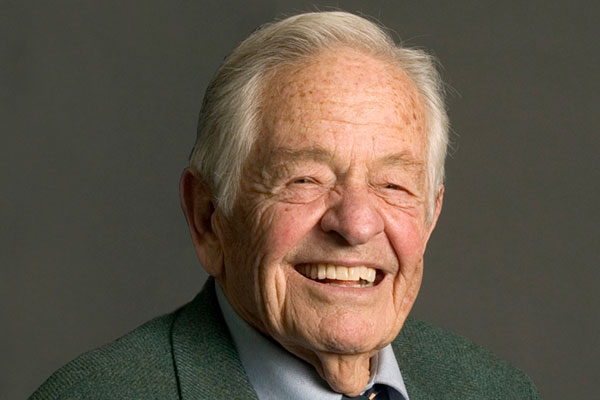Boston Doctor To Receive Presidential Medal
Dr. T. Berry Brazelton. Photo courtesy of Insieme/Fulvia Farassino
Dr. T. Berry Brazelton, a Boston doctor responsible for such revolutionary developments as the Neonatal Behavioral Assessment Scale (NBAS), will be awarded a Presidential Citizens Medal tomorrow in Washington, D.C. Brazelton and 12 others were selected from 6,000 nominees to receive the medal, a prize designed to honor Americans who have made major contributions to the country or their community through service. It is the second-highest civilian honor, after the Presidential Medal of Freedom.
“I was so excited, my god,” Brazelton says of learning he had been chosen. “I never expected to get it. It was thrilling.”
Brazelton’s achievements are many, but he says NBAS, a scale used to asses the physical, neurological, and emotional health of newborns as well as their individual differences, is his greatest achievement. Brazelton began work on the scale in 1955 when, he says, people treated babies like “lumps of clay” and it was introduced for the first time in 1973. “We now use it to show parents how exciting their babies are, and what their baby’s temperament is like, and how to nurture each child as an individual,” Brazelton says. “Using the newborn assessment has taught us how important it is to start with babies and families right from the start.”
Josh Sparrow, director of strategy, planning, and program development at the Boston Children’s Hospital Brazelton Touchpoints Center, which is aimed at guiding childhood development through strengthening the relationship between families and babies, says the field wouldn’t be the same without the NBAS. “It’s the kind of thing that’s had so much impact that people don’t really even recognize anymore where these changes come from, and kind of take it all for granted,” Sparrow says. “It’s completely transformed all of the fields related to newborn behavior.”
The Touchpoint Center, which also encompasses the Brazelton Institute, a center devoted to promoting infant and family health, forms the basis for most of Brazelton and his team’s current work. Most recently, the group received a five-year, multimillion-dollar grant for disseminating research about family and child development. Sparrow says the grant will allow the organization to spread its teaching even further. “The focus is really to take the science and put it into practice,” he says, “and to take this new way of understanding how it is that children develop to professionals that are working with families, because it has really major implications for what they do in their work.”
In addition to the grant, Brazelton—who is still hard at work at age 94—and his team are collecting data on how their work has impacted families and children nationwide. “We’ve learned how little it takes to help these families help their children develop optimally,” Brazelton explains.
According to Sparrow, though, Brazelton himself—a professor emeritus at Harvard Medical School, and the author of more than 200 scholarly research papers—is largely to thank for that knowledge. “He really nurtured a couple of generations of leaders in all the fields related to infant and early childhood development,” Sparrow says. “And not just healthcare, but education and social services and policy and advocacy.”



